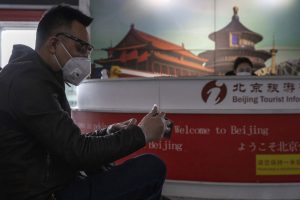 The first months of 2020 have come with exceptional volatility, not least due to the global spread of COVID-19. The disease, caused by a novel coronavirus which first broke out in China’s central city of Wuhan, has infected people in more than 100 countries and killed more than 4,000 people. The World Health Organization declared the novel coronavirus a global pandemic earlier this week. While Chinese cases still account for nearly 60 percent of the world’s total, the country’s rate of infection has slowed significantly following aggressive measures.
The first months of 2020 have come with exceptional volatility, not least due to the global spread of COVID-19. The disease, caused by a novel coronavirus which first broke out in China’s central city of Wuhan, has infected people in more than 100 countries and killed more than 4,000 people. The World Health Organization declared the novel coronavirus a global pandemic earlier this week. While Chinese cases still account for nearly 60 percent of the world’s total, the country’s rate of infection has slowed significantly following aggressive measures.
Viruses, of course, are not constrained by borders. Each government with new cases faces its own test in managing the outbreak and implementing a response. While countries in the West find themselves under increasing pressure, Beijing appears to be taking the opportunity to alter the narrative around the coronavirus and its own efforts both domestically and internationally.
When the vast majority of cases remained concentrated in China, Beijing was subject to significant criticism for a slew of reasons, including violations of individual rights and censorship, withholding information, and underreporting the severity. At the height of the outbreak in China, the official line from Beijing pushed Chinese solidarity — even a “people’s war” against the virus — and expressed thanks to its partners around the world for supporting its efforts. In February, Foreign Ministry Spokesperson Hua Chunying stated that China had received assistance from numerous sources. She added, “Friends in many countries have also offered us support. A friend in need is a friend indeed. I’d like to thank them all.” At the start of the February 14 daily briefing, Foreign Ministry Spokesperson Geng Shuang presented a video foreign ambassadors and representatives demonstrating their confidence in China’s ability to respond to the health crisis and the government’s capacity.
The widespread outbreak of the virus has also resulted in increased xenophobia and more incidents of racism against Chinese living abroad and other Asian communities as well.
However, now that Beijing has declared its peak over, the bureaucratic apparatus, which had shifted to an inward focus to address the virus, has pivoted out again. In statements from the Ministry of Foreign Affairs, China is painting itself as a success story. Earlier this week, the foreign ministry said “[China will] contribute [its] strength and wisdom to securing a final victory against the pandemic and to building a community with a shared future for mankind.” Beijing has also sent experts and much needed medical supplies to countries suffering the worst from the crisis, including Italy and Iran (although not necessarily for free). China has also contributed an estimated additional $20 million to the WHO in a bid to strengthen the global response to the pandemic.
China is not alone in praising its own response. Keiji Fukuda, former special adviser on pandemic influenza to the director-general of the WHO and current head of the Public Health School at the University of Hong Kong, said in an interview with China Daily that China could play a “mentoring role to provide information to others.” Separately, the WHO’s Dr. Bruce Aylward, who led a fact-finding mission to Wuhan to learn and report back about China’s measures, has said “the world owes such a huge debt to the people of Wuhan.” He even added, “If I had COVID-19, I want to be treated in China.” These clips of Aylward have circulated prominently on Chinese media outlets and on social media.
Not all of the praise is new. Even in early February, Hua Chunying said that “China is setting a new standard for outbreak response.” In more recent briefings, the foreign ministry has said, “We have shared with them the genetic sequence of the virus, responded to their concerns and strengthened international cooperation. The world has already reached the clear, fair consensus that China’s contribution bought precious time for the international community to enhance preparedness.”
Not all messaging, however, has strictly concentrated on public health issues. Language in China in the past week has intensified further. As U.S. officials criticized China for it role in managing the initial outbreak, reports have since emerged that Beijing instructed its embassies to raise doubts about the origins of the novel coronavirus. Zhao Lijian, a foreign ministry spokesperson, tweeted and shared stories alleging a conspiracy theory that the U.S. Army began to spread the virus at the Military World Games hosted in Wuhan last fall. Separately, Hua and op-eds in pro-party outlets such as the Global Times have chastised the United States for using this moment to spread a “political virus.”
As Washington and other capitals around the world struggle to implement measures to limit transmission and improve treatment, China will likely continue to leverage its capacity to assist others suffering from informational and material shortages. But it remains unclear how hard the economic implications for Chinese production and global supply chains will hit in the coming months. Amid this uncertainty, Beijing will continue to double down on a narrative that it acted responsibly and played a formative, even leadership role, in the governance of this global pandemic, both in a bid to obscure its coverup efforts and to rebuild its international reputation.
No comments:
Post a Comment